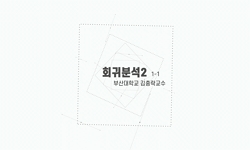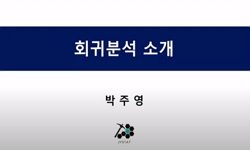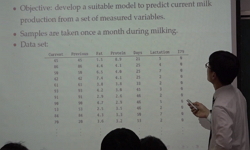Recently, the number of studies examining mediator and moderator effects has been increasing within the field of counseling psychology. Both types of effects hold much potential for furthering our understanding of complicated relations among variables...
http://chineseinput.net/에서 pinyin(병음)방식으로 중국어를 변환할 수 있습니다.
변환된 중국어를 복사하여 사용하시면 됩니다.
- 中文 을 입력하시려면 zhongwen을 입력하시고 space를누르시면됩니다.
- 北京 을 입력하시려면 beijing을 입력하시고 space를 누르시면 됩니다.

상담심리 연구에서 매개효과와 조절효과 검증: 개념적 구분 및 자료 분석 시 고려 사항 = Testing Mediator and Moderator Effects in Counseling Psychology Research: Conceptual Distinction and Statistical Considerations
한글로보기부가정보
다국어 초록 (Multilingual Abstract)
Recently, the number of studies examining mediator and moderator effects has been increasing within the field of counseling psychology. Both types of effects hold much potential for furthering our understanding of complicated relations among variables and also identifying variables that counselors may need to focus their attention in counseling practice. However, there is confusion over the meaning of and differences between mediator and moderator effects in counseling psychology research. The purposes of this article a re to (a) conceptually differentiate between mediator and moderator effects and (b) describe how to test each type of effect. The author focuses on the use of multiple regression and structural equation modeling to detect mediator and moderator effects. In particular, the author introduces Ping's (1996) two-step approach to analyzing moderator effects using structural equation modeling in studies involving continuous moderators.
국문 초록 (Abstract)
최근 들어 매개효과 및 조절효과를 검증한 논문들이 상담심리학 분야에서 꾸준히 증가하고 있다. 매개효과와 조절효과는 상담심리학자들이 관심을 두고 있는 다양한 심리 현상에 대한 이해...
최근 들어 매개효과 및 조절효과를 검증한 논문들이 상담심리학 분야에서 꾸준히 증가하고 있다. 매개효과와 조절효과는 상담심리학자들이 관심을 두고 있는 다양한 심리 현상에 대한 이해를 증진시킬 수 있다는 점에서 그 의미가 크다. 특히, 변인들 간에 존재하는 복잡한 관계를 이해할 수 있을 뿐 아니라 상담실제에서 보다 초점을 두고 개입해야 할 변인들을 확인할 수 있다. 그러나 많은 연구자들이 매개효과와 조절효과가 정확히 무엇을 의미하고 어떻게 다른지에 대해 여전히 혼란스러워 하고 있는 듯하다. 이에 본 논문에서는 매개효과와 조절효과를 개념적으로 구분하고, 매개효과 및 조절효과를 검증하기 위한 자료 분석 절차를 기술하였다. 매개효과를 검증하는 방법으로는 다중 회귀분석과 구조방정식 모형을 소개하였고, 구조방정식 모형을 적용해서 자료를 분석할 때 많이 사용하는 문항꾸러미와 부트스트래핑 절차에 관해서도 기술하였다. 조절효과를 검증하는 방법으로는 위계적 회귀분석과 구조방정식 모형을 소개하였는데, 특히 예측변인과 조절변인이 모두 연속변인일 경우 구조방정식 모형을 적용할 때 많이 사용되는 Ping(1996)의 2단계 접근을 소개하였다.
참고문헌 (Reference)
1 김민선, "평가염려 완벽주의와 사회불안의 관계: 부정적 평가에 대한 두려움과 자기제시동기의 매개효과 검증" 한국심리학회 28 (28): 525-545, 2009
2 안하얀, "성인애착, 심리적 디스트레스, 대인관계문제: 피드백에 대한 반응, 정서적 대처, 사회적 지지 추구의 매개효과 검증" 한국상담심리학회 22 (22): 575-603, 2010
3 조화진, "부모애착, 분리-개별화, 성인애착, 대학생활적응, 심리적 디스트레스의 관계 -대학신입생을 대상으로-" 한국상담심리학회 22 (22): 385-411, 2010
4 Holmbeck, G. N., "Toward terminological, conceptual, and statistical clarity in the study of mediators and moderators: Examples from the child-clinical and pediatric psychology literature" 65 : 599-610, 1997
5 Lent, R. W., "Toward a unifying social cognitive theory of career and academic interest, choice, and performance" 45 : 79-122, 1994
6 Chaplin, W. F., "The next generation in moderation research in personality psychology" 59 : 143-178, 1991
7 Baron, R. M., "The moderator-mediator variable distinction in social psychological research: Conceptual, strategic, and statistical considerations" 51 : 1173-1182, 1986
8 Karney, B. R., "The longitudinal course of marital quality and stability: A review of theory, method, and research" 118 : 3-34, 1995
9 Bandalos, D. L., "The effects of item parceling on goodness-of-fit and parameter estimate bias in structural equation modeling" 9 : 78-102, 2002
10 Frazier, P. A., "Testing moderator and mediator effects in counseling psychological research" 51 : 115-134, 2004
1 김민선, "평가염려 완벽주의와 사회불안의 관계: 부정적 평가에 대한 두려움과 자기제시동기의 매개효과 검증" 한국심리학회 28 (28): 525-545, 2009
2 안하얀, "성인애착, 심리적 디스트레스, 대인관계문제: 피드백에 대한 반응, 정서적 대처, 사회적 지지 추구의 매개효과 검증" 한국상담심리학회 22 (22): 575-603, 2010
3 조화진, "부모애착, 분리-개별화, 성인애착, 대학생활적응, 심리적 디스트레스의 관계 -대학신입생을 대상으로-" 한국상담심리학회 22 (22): 385-411, 2010
4 Holmbeck, G. N., "Toward terminological, conceptual, and statistical clarity in the study of mediators and moderators: Examples from the child-clinical and pediatric psychology literature" 65 : 599-610, 1997
5 Lent, R. W., "Toward a unifying social cognitive theory of career and academic interest, choice, and performance" 45 : 79-122, 1994
6 Chaplin, W. F., "The next generation in moderation research in personality psychology" 59 : 143-178, 1991
7 Baron, R. M., "The moderator-mediator variable distinction in social psychological research: Conceptual, strategic, and statistical considerations" 51 : 1173-1182, 1986
8 Karney, B. R., "The longitudinal course of marital quality and stability: A review of theory, method, and research" 118 : 3-34, 1995
9 Bandalos, D. L., "The effects of item parceling on goodness-of-fit and parameter estimate bias in structural equation modeling" 9 : 78-102, 2002
10 Frazier, P. A., "Testing moderator and mediator effects in counseling psychological research" 51 : 115-134, 2004
11 Hong, S., "Testing configural, metric, scalar, and latent mean invariance across gender in sociotropy and autonomy using non-western sample" 63 : 636-654, 2003
12 Stone-Romero, E. F., "Techniques for detecting moderating effects: Relative statistical power of multiple regression and the comparison of subgroup-based correlation coefficients" 79 : 354-359, 1994
13 Shneidman, E. S., "Suicide as psychache" 181 : 145-147, 1993
14 Cohen, S., "Stress, social support, and the buffering hypothesis" 98 : 310-357, 1985
15 Aguinis, H., "Statistical power problems with moderated multiple regression in management research" 21 : 1141-1158, 1995
16 Aguinis, H., "Statistical power computations for detecting dichotomous moderator variables with moderated multiple regression" 58 : 668-676, 1998
17 Moradi, B., "Roles of sexual objectification experiences and internalization of standards of beauty in eating disorder symptomatology: A test and extension of objectification" 52 : 420-428, 2005
18 Constantine, M. G., "Racial microaggressions against African American Clients in cross-racial counseling relationships" 54 : 1-16, 2007
19 Tokar, D. M., "Psychological separation, attachment security, vocational self-concept crystallization, and career indecision: A structural equation analysis" 50 : 3-19, 2003
20 Salafia, E. H. B., "Psychological distress as a mediator of the relation between perceived maternal parenting and normative maladaptive eating among adolescent girls" 54 : 434-446, 2007
21 Flamenbaum, R., "Psychache as a mediator in the relationship between perfectionism and suicidality" 54 : 51-61, 2007
22 Judd, C. M., "Process analysis: Estimating mediation in treatment evaluations" 5 : 602-619, 1981
23 Vogel, D. L., "Perceived public stigma and the willingness to seek counseling: The mediating roles of self-stigma and attitudes toward counseling" 54 : 40-50, 2007
24 MacCallum, R. C., "On the practice of dichotomization of quantitative variables" 7 : 19-40, 2002
25 Fredrickson, B. L., "Objectification theory: Toward understanding women's lived experience and mental health risks" 21 : 173-206, 1997
26 Aiken, L. S., "Multiple regression: Testing and interpreting interactions" Sage 1991
27 Wei, M., "Moderating effects of three coping strategies and self-esteem on perceived discrimination and depressive symptoms: A minority stress model for Asian international students" 55 : 451-462, 2008
28 Aguinis, H., "Methodological artifacts in moderated multiple regression and their effects on statistical power" 82 : 192-206, 1997
29 MacKinnon, D. P., "Mediation, confounding, and suppression: Different names for the same effect" 1 : 173-181, 2000
30 Shrout, P. E., "Mediation in experimental and nonexperimental studies: New procedures and recommendations" 7 : 422-445, 2002
31 MacKinnon, D. P., "Mediating mechanisms in a program to reduce intentions to use anabolic steroids and improve exercise self-efficacy and dietary behavior" 2 : 15-27, 2001
32 Hoyle, R. H., "Mediated and moderated effects in social psychological research: Measurement, design, and analysis issues. in: Handbook of methods in social psychology" Sage 2003
33 Pederson, E. L., "Male gender role conflict and willingness to seek counseling: Testing a mediation model on college-aged men" 54 : 373-384, 2007
34 Ping, R. A., "Latent variable interaction and quadratic effect estimation: A two-step technique using structural equation analysis" 119 : 166-175, 1996
35 Bandalos, D. L., "Item parceling issues in structural equation modeling. in: New developments and techniques in structural equation modeling" Lawrence Erlbaum Associates, Inc. 269-296, 2001
36 Bandalos, D. L., "Is parceling really necessary? A comparison of results from item parceling and categorical variable methodology" 15 : 211-240, 2008
37 MacKinnon, D. P., "Introduction to statistical mediation analysis" Taylor & Francis Group 2008
38 Bollen, K. A., "Interaction of latent variables in structural equation models" 5 : 267-293, 1998
39 Jaccard, J., "Interaction effects in multiple regression" Sage 1990
40 Grissom, R., "Heterogeneity of variance in clinical data" 68 : 155-165, 2000
41 Larsen, H., "Friendship quality as a moderator between perception of interparental conflicts and maladjustment in adolescence" 31 : 549-558, 2007
42 Widaman, K. F., "Factorial invariance within longitudinal structural equation models: Measuring the same construct across time" 4 : 10-18, 2010
43 Widaman, K. F., "Exploring the measurement invariance of psychological instruments: Applications in the substance use domain. in: The science of prevention: Methodological advances from alcohol and substance abuse research" American Psychological Association 281-324, 1997
44 West, S. G., "Experimental personality designs: Analysing categorical by continuous variable interactions" 64 : 1-49, 1996
45 MacKinnon, D. P., "Estimating mediated effects in prevention studies" 17 : 144-158, 1993
46 Ping, R. A., "Estimating latent variable interactions and quadratics: The state of this art" 22 : 163-183, 1996
47 Kenny, D. A., "Data analysis in social psychology. in: The handbook of social psychology (4th ed.)" Oxford University Press 233-265, 1998
48 MacKinnon, D. P., "Contrasts in multiple mediator models. in: Multivariate applications in substance use research: New methods for new questions" Erlbaum 141-160, 2000
49 Moulder, B. C., "Comparison of methods for estimating and testing latent variable interactions" 9 : 1-19, 2002
50 Ludwikowski, W. M. A., "Attitudes toward career counseling: The role of public and self-stigma" 56 : 408-416, 2009
51 Sobel, M. E., "Asymptotic confidence intervals for indirect effects in structural equation models. in: Sociological methodology 1982" American Sociological Association 290-312, 1982
52 Brown, R. L., "Assessing specific mediational effects in complex theoretical models" 4 : 142-156, 1997
53 Mason, C. A., "Assessing moderator variables: Two computer simulation studies" 56 : 45-62, 1996
54 Cohen, J., "Applied multiple regression/correlation analysis for the behavioral sciences (3rd ed.)" Erlbaum 2003
55 Russell, D. W., "Analyzing data from experimental studies: A latent variable structural equation modeling approach" 45 : 18-29, 1998
56 Busemeyer, J., "Analysis of multiplicative causal rules when the causal variables are measured with error" 93 : 549-562, 1983
57 Wegener, D., "Analysis and design for nonexperimental data addressing causal and noncausal hypotheses. in: Handbook of research methods in social and personality psychology" Cambridge University Press 412-450, 2000
58 Augustus-Horvath, C. L., "A test and extension of objection theory as it predicts disordered eating: Does women's age matter?" 56 : 253-265, 2009
59 Ciarrochi, J., "A longitudinal study into the interplay between problem orientation and adolescent well-being" 56 : 441-449, 2009
60 Bagozzi, R. P., "A general approach for representing constructs in organizational research" 1 : 45-87, 1998
61 MacKinnon, D. P., "A comparison of methods to test mediation and other intervening variable effects" 7 : 83-104, 2002
동일학술지(권/호) 다른 논문
-
완벽주의가 폭식행동에 미치는 영향: 자기비난, 신체비교, 신체불만족의 매개효과
- 한국상담심리학회
- 손은정
- 2010
- KCI등재
-
현대 상담심리학에서 본 중아함경에 나타난 붓다의 교화 사례 연구: 상담 과정, 호소 문제, 상담 기법을 중심으로
- 한국상담심리학회
- 권경희
- 2010
- KCI등재
-
- 한국상담심리학회
- 서수균
- 2010
- KCI등재
-
중학생의 내현적 자기애와 우울과의 관계: 자기비난과 수치심의 매개효과
- 한국상담심리학회
- 권희영
- 2010
- KCI등재
분석정보
인용정보 인용지수 설명보기
학술지 이력
| 연월일 | 이력구분 | 이력상세 | 등재구분 |
|---|---|---|---|
| 2026 | 평가예정 | 재인증평가 신청대상 (재인증) | |
| 2020-01-01 | 평가 | 등재학술지 유지 (재인증) |  |
| 2017-01-01 | 평가 | 등재학술지 유지 (계속평가) |  |
| 2013-01-01 | 평가 | 등재학술지 유지 (등재유지) |  |
| 2010-01-01 | 평가 | 등재학술지 유지 (등재유지) |  |
| 2008-01-01 | 평가 | 등재학술지 유지 (등재유지) |  |
| 2006-06-07 | 학술지등록 | 한글명 : 한국심리학회지: 상담 및 심리치료외국어명 : Korean Journal Of Counseling And Psychotherapy |  |
| 2006-01-01 | 평가 | 등재학술지 유지 (등재유지) |  |
| 2003-01-01 | 평가 | 등재학술지 선정 (등재후보2차) |  |
| 2002-01-01 | 평가 | 등재후보 1차 PASS (등재후보1차) |  |
| 2000-07-01 | 평가 | 등재후보학술지 선정 (신규평가) |  |
학술지 인용정보
| 기준연도 | WOS-KCI 통합IF(2년) | KCIF(2년) | KCIF(3년) |
|---|---|---|---|
| 2016 | 2.32 | 2.32 | 2.3 |
| KCIF(4년) | KCIF(5년) | 중심성지수(3년) | 즉시성지수 |
| 2.39 | 2.58 | 3.685 | 0.35 |




 KCI
KCI







